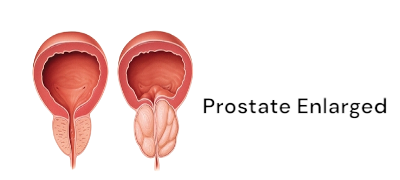


In fact, 70-80% of patients with urinary symptoms and an enlarged prostate get relief with medications and lifestyle changes. Other patients may require surgery.
Answer: Not necessary.
You must consult a qualified urologist, who will take a look at your medical history, medications, do some tests, and if required, change the dose/drug or add another drug or suggest an operation.
Answer: Prostate surgery is required in the following conditions-
Retention of urine even after taking medication, / Frequent urination
frequent urinary tract infections
Frequent blood in the urine
Bladder stones/diverticula/kidney swelling
Not getting relief from medicines.
Reluctance to take medicine
Answer: Incisional (open) prostate surgery is rarely performed today. Nowadays, prostate surgery is done through the natural urinary tract endoscopically (ENDOSCOPICALLY) without any incision/hole/scar.
There will be a pipe (catheter) in the urinary tract after the operation, which will be removed after 2 or 3 days, and you will be discharged.
TURP: In this technique, the part of the enlarged prostate that is blocking the urethra is removed using ELECTROCAUTERY and ENDOSCOPY.
HOLEP: In this technique, the part of the enlarged prostate blocking the urethra is removed using LASER and ENDOSCOPY.
Answer: HOLEP is a new LASER technology, with the following advantages:
bleeding less
Prostatectomy
HOLEP is a boon for the following patients-
Prostate larger than 50 cc
heart patient
patients taking blood thinners
Serum PSA (Prostate Specific Antigen) is a glycoprotein secreted by the prostate. Its normal measurement is <4 ng/ml. Serum PSA increases proportionately with the increase in prostate size.
However, if the serum PSA rises abnormally / unevenly, it may indicate prostate cancer.
Answer: Not necessary.
There are many conditions other than prostate cancer, such as prostatitis, recent prostate massage/DRE, retention of urine or recent ejaculation.
Answer: You should consult a qualified urologist. He will assess your medical history and reports, do a digital rectal examination for prostate, and if required, suggest a multi-parametric MRI. If prostate cancer is suspected, a TRUS guided prostate biopsy will be required for confirmation.
Answer: PROSTATE is not a disease; it is a normal part of every man. Every man is born with a prostate. The prostate is a gland located around the urinary tube (urethra). In Hindi, we call it Gadud or Prostate. The function of the prostate is to produce nutrients for sperm, and its secretions make up about 40% of semen volume.
Answer: Prostate enlargement is not a disease; it is a normal process of aging after the fourth decade of life. In medical language, we call it Benign Prostatic Hyperplasia BENIGN PROSTATIC HYPERPLASIA. When enlarged, the prostate may or may not block/obstruct/narrow the urethra.
Treatment is required only when the enlargement of the prostate is blocking/obstructing/narrowing the urethra, resulting in difficulty in passing urine. Therefore, if someone is having difficulty passing urine, they should consult a qualified urologist.
Answer: If you have the following problems urinating, then your prostate may be blocking/obstructing/narrowing the urethra.
Nocturia (the need to wake up during the night to urinate)
FREQUENCY (the need to urinate more often than usual or more than 8 times a day)
URGENCY
INTERMITTENCY
INCOMPLETE VOIDING
The need to strain to urinate
WEAK STREAM/POOR FLOW
INCONTINENCE Urinary incontinence (involuntary leakage of urine)
Answer: Not at all.
If you are having any of the above difficulties in passing urine, you must consult a qualified urologist.
For Consultation, Contact Dr Ghanendra Kumar Yadav (Urologist and Kidney Transplant Surgeon) in Drgkurologist in Gurugram, Haryana